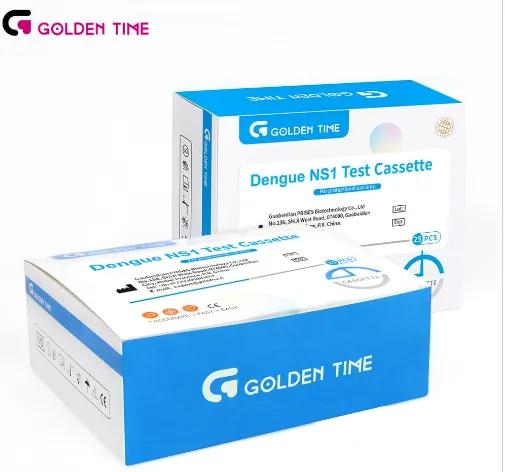Sep . 12, 2024 13:46 Back to list
Revolutionizing Dengue Diagnosis: The Power of the Dengue NS1 Rapid Diagnostic Test Kit
In the realm of infectious diseases, dengue fever stands as a formidable challenge, particularly in tropical and subtropical regions worldwide. With its ability to rapidly spread and cause a wide spectrum of symptoms ranging from mild fever to severe complications like dengue shock syndrome and dengue hemorrhagic fever, accurate and timely diagnosis is paramount. The advent of the Dengue NS1 Rapid Diagnostic Test Kit has marked a significant milestone in our fight against this mosquito-borne illness, revolutionizing the way we detect and manage dengue cases.
Understanding Dengue and the Need for Rapid Diagnosis
Dengue is caused by four serotypes of the dengue virus, transmitted primarily by the Aedes aegypti and Aedes albopictus mosquitoes. It is estimated that half of the world's population is at risk of dengue infection, with approximately 50-100 million cases occurring annually. Early detection is crucial as it enables prompt treatment, reduces the risk of severe complications, and aids in containing outbreaks. Traditional diagnostic methods, such as viral culture and serology, can be time-consuming and require specialized laboratory facilities, limiting their usefulness in resource-limited settings.
Introducing the Dengue NS1 Rapid Diagnostic Test Kit
Enter the Dengue NS1 Rapid Diagnostic Test Kit, a game-changer indengue rapid test. This innovative test kit utilizes the non-structural protein 1 (NS1) antigen, which is produced early in the course of dengue infection and can be detected in the blood even before antibodies develop. This feature makes the NS1 test an ideal tool for early diagnosis, typically within the first few days of illness onset.
Key Advantages of the Dengue NS1 Test Kit
- Rapid Results: Unlike traditional methods, the Dengue NS1 Rapid Testprovides results in as little as 15-30 minutes, enabling healthcare professionals to make timely treatment decisions.
- High Sensitivity and Specificity: The test is designed to accurately detect NS1 antigen, minimizing false positives and false negatives, even in patients with low viral loads.
- Ease of Use: The test kit is user-friendly, requiring minimal training and equipment, making it suitable for use in both laboratory and point-of-care settings.
- Cost-Effectiveness: By facilitating early detection and treatment, the Dengue NS1 Test Kitcan help reduce the overall cost of managing dengue cases, including hospitalization and long-term care.
- Versatility: Some advanced versions, known as Dengue Duo Kit,dengue ag test,combine NS1 antigen detection with IgM/IgG antibody testing, offering a more comprehensive diagnostic profile across different stages of infection.
Impact on Patient Care and Public Health
The implementation of the Dengue NS1 Rapid Diagnostic Test Kit has had a profound impact on both individual patient care and broader public health strategies. For patients, early diagnosis means earlier access to appropriate treatment, reducing the likelihood of disease progression and improving overall outcomes. In communities, the rapid turnaround time of test results enables health authorities to quickly identify and isolate cases, preventing further spread and dengue rapid test.
Challenges and Future Directions
While the Dengue NS1 Rapid Diagnostic Test Kit represents a significant step forward, challenges remain. Variations in NS1 antigen levels among different dengue serotypes and individuals can affect test sensitivity. Additionally, the test may not detect NS1 in some patients late in their illness or those with secondary dengue infections. Ongoing research is focused on enhancing the sensitivity and specificity of these tests, as well as developing point-of-care devices that can further streamline diagnosis.
In conclusion, the Dengue NS1 Rapid Diagnostic Test Kit represents a significant advancement in the battle against dengue fever. Its ability to provide rapid, accurate, and cost-effective diagnosis has transformed patient care and public health strategies worldwide. As we continue to grapple with the challenges posed by infectious diseases, the development and dengue ag test dissemination of such innovative diagnostic tools will be essential in safeguarding the health and well-being of communities across the globe. The future of dengue diagnosis is bright, and the Dengue NS1 Rapid Diagnostic Test Kit stands as a testament to the power of medical innovation in addressing the world's most pressing health challenges.


